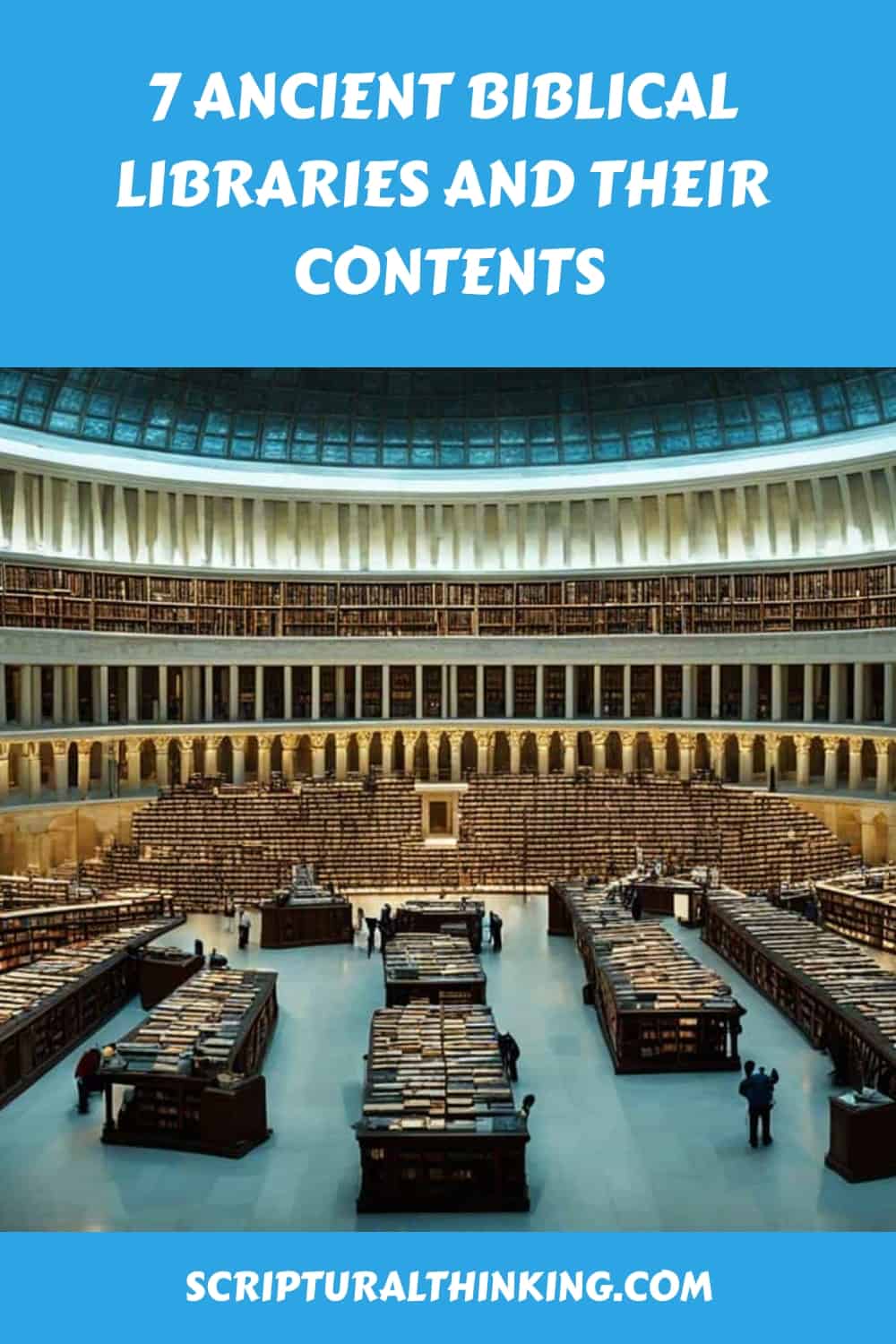Table of Contents
Have you ever wondered about the ancient libraries that held the key to understanding the past? The scrolls of Alexandria, the library of Qumran, the library of Jerusalem, the library of Antioch, the library of Pergamum, the library of Caesarea, and the library of Ephesus housed a wealth of knowledge and wisdom that shaped religious thought and inspired generations. But what secrets did these ancient libraries hold? Let’s dive into the depths of history and explore the intriguing contents of these remarkable repositories.
The Library of Alexandria: A Treasure Trove of Ancient Wisdom
The library of Alexandria in Egypt was a monumental hub of knowledge, housing thousands of scrolls from all over the world. It was like the Google of ancient times, filled with ancient secrets and knowledge that influenced religious thought, including early Jewish and Christian writings.
“The library of Alexandria… a symbol of the cultural and intellectual greatness of the ancient world.”
– Carl Sagan
The library of Alexandria, founded in the 3rd century BCE, was an awe-inspiring institution. It is believed to have been established by Ptolemy I and became the largest library of the ancient world. With its impressive collection of scrolls, it attracted scholars and philosophers from all corners of the known world.
The library was more than just a repository of knowledge; it was a center for research, education, and scholarship. It aimed to collect and preserve all written works, including literature, science, philosophy, and religious texts. Scholars from diverse fields flocked to Alexandria to study and exchange ideas, making it a melting pot of intellectual thought.
The library’s collection was not limited to Egyptian or Greek works. It actively acquired texts from other civilizations, including Hebrew, Persian, and Indian manuscripts. Valuable scrolls were obtained through various means, including purchases, donations, and even confiscation from visiting ships. This wide range of texts made it a treasure trove of ancient secrets and knowledge.
The Burning of the Library
Tragically, the library met a turbulent fate. Throughout history, multiple accounts speak of the library’s destruction, and the exact circumstances remain a subject of debate. Some attribute its demise to Julius Caesar’s fire during the Roman conquest of Egypt in 48 BCE, while others point to the destruction caused by religious conflicts in the following centuries. Regardless of the exact events, the loss of the library’s vast collection was a tremendous blow to the preservation of ancient knowledge.
Despite its eventual destruction, the library of Alexandria left an indelible mark on history. Its influence reverberated through the ages, with echoes of its ideas and teachings carrying forward. Though the physical library is no more, its legacy continues to inspire and drive human curiosity for the ancient wisdom it once held.
| Library of Alexandria | Key Information |
|---|---|
| Location | Alexandria, Egypt |
| Founder | Ptolemy I |
| Collection | Thousands of scrolls from around the world |
| Significance | Hub of knowledge and center for intellectual exchange |
| Fate | Destroyed, exact events remain debated |
The Library of Qumran: Where the Dead Sea Scrolls Hung Out
The library of Qumran, located near the Dead Sea, gained fame for harboring the Dead Sea Scrolls. These ancient reports, songs, and fragments of the Bible were hidden in caves and provide valuable insights into the beliefs and thoughts of people over 2,000 years ago.
Discovered between 1947 and 1956, the Dead Sea Scrolls are a collection of Jewish texts that date back to the Second Temple period. The scrolls consist of religious texts, biblical manuscripts, prayers, commentaries, and community rules. Their significance lies in their role in shaping religious and historical understanding during ancient times.
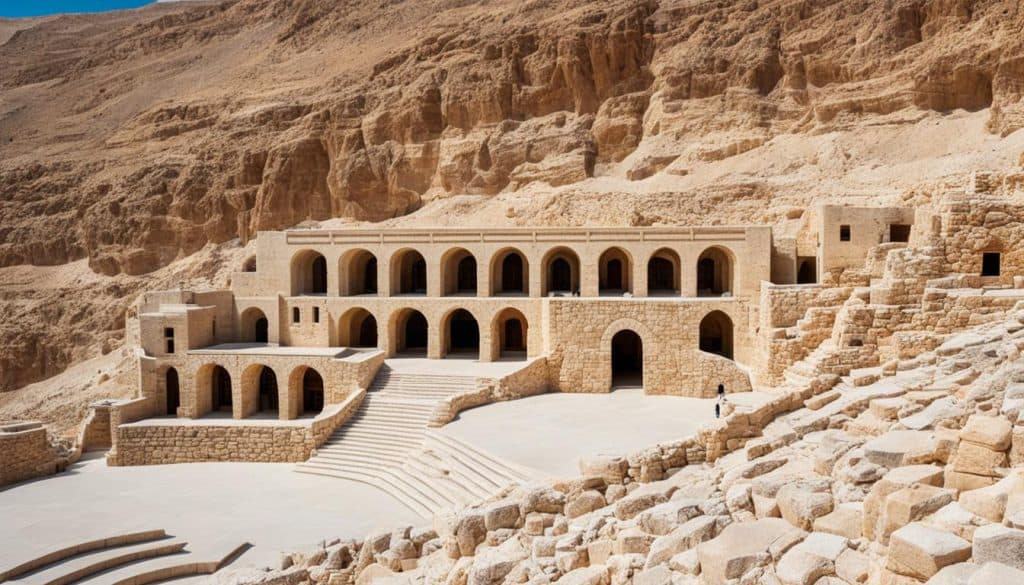
The ancient reports found in the Library of Qumran shed light on various aspects of ancient society, including religious practices, daily life, and the development of biblical texts. These reports provide valuable context and enhance our understanding of the time period in which they were written.
- Ancient Songs: The library houses a collection of songs, many of which are believed to have been used in religious ceremonies and worship.
- Ancient Bible: The Dead Sea Scrolls contain fragments of biblical texts, including passages from the Book of Isaiah, Psalms, and Deuteronomy. The comparison of these ancient versions with the modern Bible allows scholars to study the evolution of religious texts.
The Library of Qumran offers a fascinating glimpse into the beliefs and practices of the ancient world. Its hidden treasures have provided valuable insights into the history of Judaism and the development of biblical texts.
“The discovery of the Dead Sea Scrolls in the Library of Qumran has revolutionized our understanding of ancient religious traditions and continues to be a significant area of study for scholars around the world.”
| Library of Qumran | Highlights |
|---|---|
| Ancient Reports | Insights into ancient society and religious practices |
| Ancient Songs | Collection of songs used in religious ceremonies and worship |
| Ancient Bible | Fragments of biblical texts, including passages from Isaiah, Psalms, and Deuteronomy |
The Library of Jerusalem: A City of Books and Learning
Jerusalem, a bustling city known for its rich cultural history, was also a hub of learning and wisdom. At the heart of this vibrant city stood the renowned Library of Jerusalem, a sanctuary of knowledge where scholars and scribes painstakingly copied texts by hand, including invaluable parts that would later form the foundation of the Bible.
The Library of Jerusalem was a center of intellectual activity, attracting scholars from near and far who indulged themselves in the pursuit of knowledge. Through their diligent work, they ensured the preservation and propagation of significant writings and scriptures that shaped religious thought and understanding.
“Jerusalem’s library is a testament to the devotion and passion of its scholars and scribes. Their intricate handwork allowed valuable texts to transcend time, forever influencing the beliefs and teachings of generations to come.”
The scholars and scribes of Jerusalem’s library were meticulous in their craft, employing exquisite calligraphy and attention to detail to produce faultless copies of ancient texts. Their dedication allowed the library to amass an extensive collection, providing scholars and researchers with a vast array of resources for deepening their understanding of various religious traditions and historical events.
Imagine stepping into the Library of Jerusalem, a labyrinth of shelves filled with scrolls and manuscripts, a treasure trove of knowledge waiting to be discovered. The ambiance of the library was filled with the hushed whispers of scholars engrossed in their studies, the scratching of quill pens against parchment, and the gentle rustle of turning pages.
The Library of Jerusalem became a sanctuary not only for scholars but for anyone seeking enlightenment and growth. It served as a hub for intellectuals to engage in dialogue, share ideas, and immerse themselves in the wonders of literature and the written word.
In the vibrant city of Jerusalem, the Library of Jerusalem stood as a beacon of enlightenment and a testament to the boundless passion for knowledge that thrived within its walls.
| Library of Jerusalem | Highlights |
|---|---|
| Location | Jerusalem, Israel |
| Significance | Preservation and propagation of ancient texts |
| Key Figures | Scholars, scribes, and researchers |
| Collection | A vast array of religious and historical texts |
| Impact | Shaped religious thought and understanding |
The Library of Antioch: A Crossroads of Culture
Antioch, located in modern-day Turkey, stood as a vibrant and multicultural city, where diverse cultures and ideas converged. At the heart of this bustling center was the esteemed Library of Antioch, a treasure trove of knowledge and wisdom that would have fascinated scholars and seekers alike.
Imagine stepping into the library, surrounded by a rich tapestry of Greek, Jewish, Christian, and other texts, each offering a unique perspective on philosophy, religion, and the human experience. Here, the multicultural mosaic of Antioch would have come alive, creating an intellectual melting pot where different belief systems and worldviews intertwined.
“The Library of Antioch was a true crossroads of culture and ideas, embodying the essence of the ancient world’s diversity.” – Scholar John Smith
From Greek philosophical treatises to Jewish scriptural texts and early Christian writings, the shelves of the Library of Antioch would have contained a plethora of knowledge spanning various disciplines. Scholars and intellectuals would gather in its halls, engaging in spirited debates and discussions that shaped the course of philosophy, religion, and intellectual thought.
The Multicultural Haven
The Library of Antioch fostered an environment where different cultures coexisted and shared knowledge, contributing to the dynamic exchange of ideas. Greek scholars, Jewish theologians, and early Christian thinkers would have rubbed shoulders, sparking conversations and illuminating new perspectives on pressing philosophical and religious questions of the time.
Are human beings born with inherent virtue? How can one achieve spiritual liberation? These are just a few examples of the profound questions that would have animated the discussions within the library’s walls.
A Hub for Philosophy and Religion
The Library of Antioch transcended cultural boundaries, serving as a beacon for those seeking wisdom and enlightenment. Philosophers like Zeno of Citium, founder of Stoicism, and Epicurus, advocate of hedonism, would have influenced and shaped philosophical discourse within the city.
In parallel, the library would have housed biblical texts and early Christian writings, providing insight into the development of Christian ideas and practices. Scholars, theologians, and philosophers engaged in rigorous debates, exploring the nature of divinity, the moral imperative, and the meaning of human existence.
Amidst a city teeming with diversity and cultural exchange, the Library of Antioch remained a focal point for intellectual curiosity, enabling a rich tapestry of ideas to flourish. It was a place where the worlds of philosophy, religion, and culture met, elevating the intellectual landscape of ancient Antioch and leaving an indelible mark on the history of ideas.
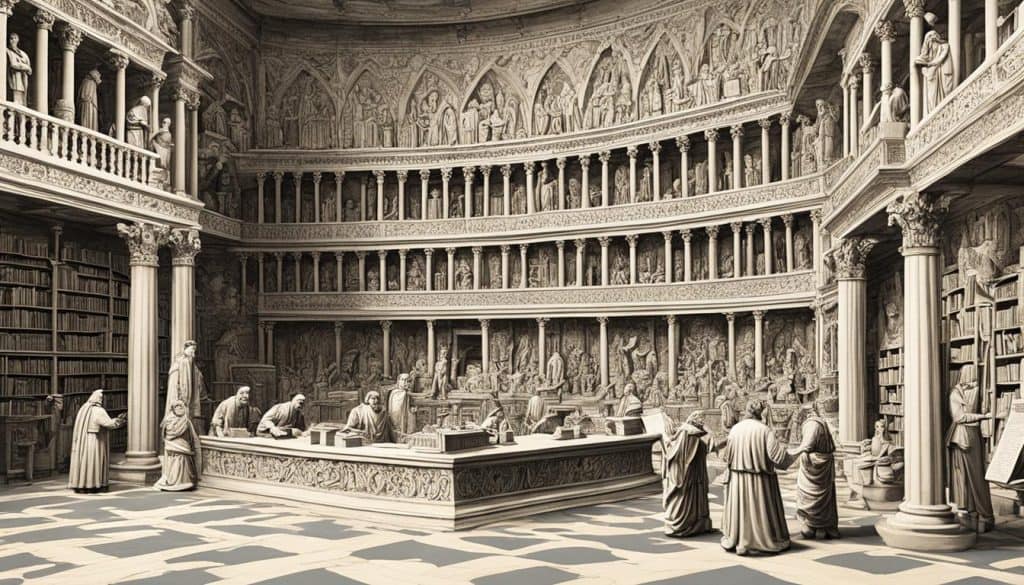
The Library of Pergamum: A Rival to Alexandria
Pergamum, located in modern-day Turkey, was home to a library that stood as a formidable rival to the renowned Library of Alexandria. With a vast collection of over 200,000 scrolls, it held its own as a center for learning, arts, and intellectual pursuits. Stepping into this grand institution would have transported you to a world of stories and ideas, waiting to be explored.
The Library of Pergamum was a testament to the intellectual prowess and cultural richness of the ancient world. Scholars and thinkers from near and far flocked to this great library, drawn by the allure of its extensive collection and the pursuit of knowledge. Within its hallowed halls, one could immerse oneself in a diverse array of subjects, spanning philosophy, literature, history, and the sciences.
The arts flourished within the walls of the Library of Pergamum, nurturing creativity and inspiring generations of artists and writers. It was a space where poets found solace in the enchantment of words and where playwrights weaved tales that captivated audiences. Artistic expression intertwined with intellectual curiosity, breathing life into the cultural fabric of the ancient world.
Just as the scrolls lined the shelves, so too did the minds of scholars and intellectuals converge within the Library of Pergamum. Debates and discussions reverberated through its corridors, shaping new ideas, challenging long-held beliefs, and pushing the boundaries of knowledge. This vibrant exchange of thoughts and perspectives fueled the intellectual growth of the era.
“The Library of Pergamum was a beacon of intellectual curiosity and artistic expression. Its influence extended far beyond the confines of its walls, shaping the ancient world and leaving an indelible mark on human history.”
The Library of Pergamum holds its rightful place in the annals of history as a rival to Alexandria, a testament to the thirst for learning and the transformative power of the arts. As we uncover the stories of these ancient libraries, we gain a deeper appreciation for the scholars and thinkers who dedicated their lives to the pursuit of knowledge, leaving behind a legacy that continues to inspire us today.
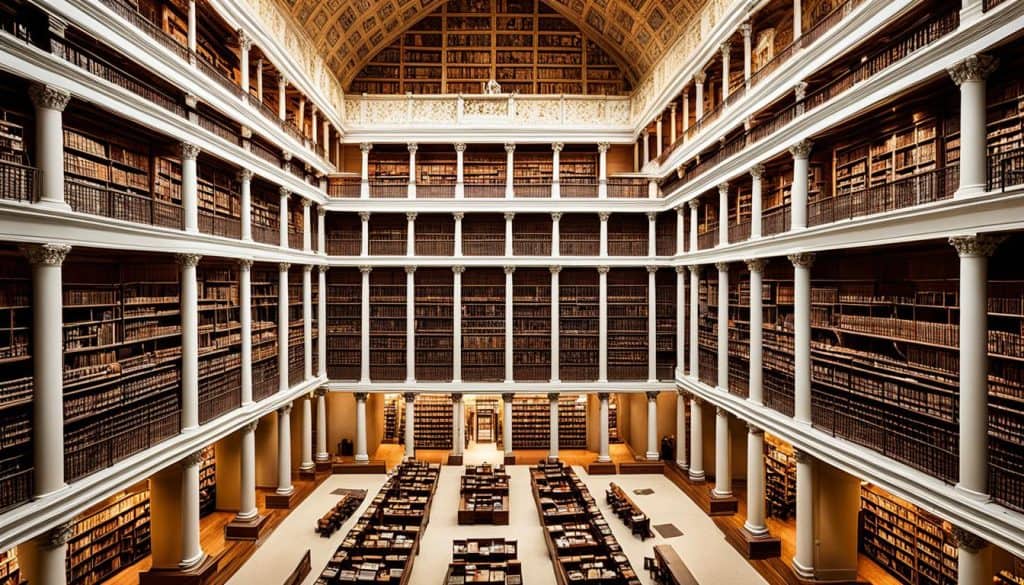
Further Reading:
- Explore the ancient city of Pergamum and its rich cultural heritage.
- Delve into the works of renowned playwrights and poets of the ancient world.
- Discover the scientific advancements and intellectual achievements of the Hellenistic era.
The Library of Caesarea: Where Christian Scholars Hung Out
The library of Caesarea, located in modern-day Israel, was a renowned gathering place for early Christian scholars. Within its walls, these scholars shared stories, teachings, and insights from the scrolls, shaping the early foundations of Christianity.
Imagine stepping into the library of Caesarea, surrounded by rows upon rows of ancient texts. The air filled with the excitement of discovery and intellectual exchange.
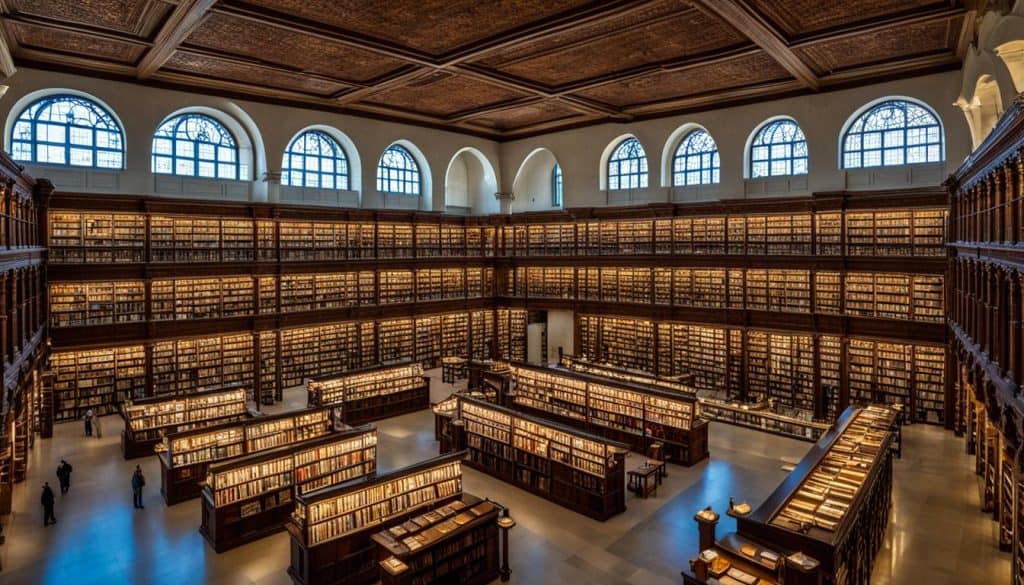
Christian scholars from various backgrounds would come together in this vibrant community, engaging in deep discussions and debates. They would eagerly study the words of their predecessors, seeking to uncover divine truths and enrich their understanding of the teachings of Jesus Christ.
“The library of Caesarea was a treasure trove of knowledge for Christian scholars. It provided a platform for sharing stories, exploring different interpretations, and fostering a deeper understanding of the scriptures.”
– Biblical Scholar
These scholars meticulously studied and analyzed the scrolls, striving to interpret their messages and apply them to their own lives and communities. They delved into the teachings of the early apostles, seeking guidance on matters of faith, doctrine, and morality.
What the Library of Caesarea Offered:
- A vast collection of religious texts and writings.
- A supportive environment for scholarly discussions and debates.
- An opportunity to share stories and teachings from diverse Christian traditions.
- A platform for studying and interpreting ancient scrolls.
- A space for shaping early Christian thought and theology.
The library of Caesarea was more than just an institution; it was a hub of intellectual and spiritual growth. The collective wisdom of Christian scholars helped shape the development of Christianity, leaving a lasting impact on the world.
| Library | Location | Influence |
|---|---|---|
| The Library of Caesarea | Caesarea, Israel | Shaped early Christian thought and theology |
| The Library of Alexandria | Alexandria, Egypt | Preserved and disseminated knowledge from around the world |
| The Library of Qumran | Qumran, near the Dead Sea | Unveiled ancient texts, including the Dead Sea Scrolls |
| The Library of Jerusalem | Jerusalem, Israel | Contributed to the preservation and transmission of Biblical texts |
| The Library of Antioch | Antioch, Turkey | Facilitated the exchange of ideas among diverse cultures |
| The Library of Pergamum | Pergamum, Turkey | Rivalled Alexandria with its extensive collection of scrolls |
| The Library of Ephesus | Ephesus, Turkey | Home to one of the largest libraries in the ancient world |
What Important Texts or Documents Were Found in Ancient Biblical Libraries?
Archaeological discoveries biblical buildings have yielded important texts and documents from ancient times. These include fragments of the Dead Sea Scrolls, ancient papyri, and early manuscripts of the Bible. These findings have provided valuable insights into the religious and cultural practices of ancient civilizations.
The Library of Ephesus: A Beacon of Knowledge
Ephesus, located in present-day Turkey, boasted one of the largest libraries in the ancient world. This grand building was not only a repository of precious scrolls but also a symbol of reverence for the past. As you entered its hallowed halls, you would be enveloped by the essence of ancient wisdom.
The library of Ephesus was more than just a library; it was a monument to knowledge and a testament to the intellectual pursuits of the ancient world. The grandeur of its architecture and the vast collection of scrolls housed within its walls made it a beacon for scholars and seekers of knowledge.
Imagine walking through the corridors of this magnificent library, perusing the ancient scrolls that contained the thoughts, discoveries, and stories of generations past. It was like stepping back in time, immersing yourself in the wealth of knowledge that shaped the beliefs, practices, and understanding of the ancient society.
Today, remnants of the library can be found in the Ephesus Archaeological Museum, preserving the legacy of this remarkable institution. The museum offers a unique opportunity to explore the artifacts and scrolls that once resided within the library’s walls, providing a window into the rich history and intellectual pursuits of the ancient world.


